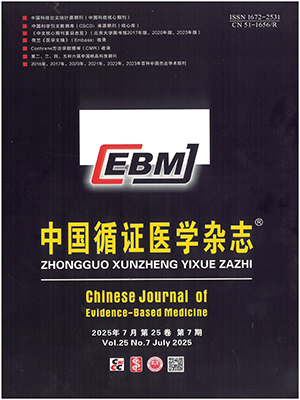| 1. |
Moher D, Liberati A, Tetzlaff J, et al. Preferred reporting items for systematic reviews and meta-analyses: the PRISMA statement. BMJ, 2009, 339: b2535.
|
| 2. |
Veginadu P, Calache H, Gussy M, et al. An overview of methodological approaches in systematic reviews. J Evid Based Med, 2022, 15(1): 39-54.
|
| 3. |
Gao Y, Yang K, Cai Y, et al. Updating systematic reviews can improve the precision of outcomes: a comparative study. J Clin Epidemiol, 2020, 125: 108-119.
|
| 4. |
Elliott JH, Turner T, Clavisi O, et al. Living systematic reviews: an emerging opportunity to narrow the evidence-practice gap. PLoS Med, 2014, 11(2): e1001603.
|
| 5. |
许吉, 邓宏勇. 动态系统评价简介. 中国循证医学杂志, 2020, 20(2): 244-248.
|
| 6. |
周川茹, 雷常彬, 王聪, 等. Cochrane快速系统评价的定义特征和方法学解读. 中国循证医学杂志, 2023, 23(2): 240-248.
|
| 7. |
田晨, 刘佳宁, 田金徽, 等. 动态系统评价制作方法与流程. 中国全科医学, 2024, (11): 1-8.
|
| 8. |
郑卿勇, 程露颖, 许建国, 等. 动态系统评价的研究现状与进展. 中国药物评价, 2021, 38(6): 471-478.
|
| 9. |
Zheng Q, Xu J, Gao Y, et al. Past, present and future of living systematic review: a bibliometrics analysis. BMJ Glob Health, 2022, 7(10): e009378.
|
| 10. |
Siemieniuk RA, Bartoszko JJ, Zeraatkar D, et al. Drug treatments for covid-19: living systematic review and network meta-analysis. BMJ, 2020, 370: m2980.
|
| 11. |
Page MJ, McKenzie JE, Bossuyt PM, et al. The PRISMA 2020 statement: an updated guideline for reporting systematic reviews. BMJ, 2021, 372: n71.
|
| 12. |
Akl EA, Khabsa J, Iannizzi C, et al. Extension of the PRISMA 2020 statement for living systematic reviews (PRISMA-LSR): checklist and explanation. BMJ, 2024, 387: e079183.
|
| 13. |
Khamis AM, Kahale LA, Pardo-Hernandez H, et al. Methods of conduct and reporting of living systematic reviews: a protocol for a living methodological survey. F1000Res, 2019, 8: 221.
|
| 14. |
Kahale LA, Elkhoury R, El Mikati I, et al. Tailored PRISMA 2020 flow diagrams for living systematic reviews: a methodological survey and a proposal. F1000Res, 2021, 10: 192.
|
| 15. |
高亚, 刘明, 杨珂璐, 等. 系统评价报告规范: PRISMA2020与PRISMA2009的对比分析与实例解读. 中国循证医学杂志, 2021, 21(5): 606-616.
|
| 16. |
张迁, 王琪, 后亮瑛, 等. 动态指南制订方法及案例介绍. 中国循证医学杂志, 2021, 21(4): 491-496.
|
| 17. |
田晨, 杨秋玉, 孙铭谣, 等. 快速动态循证指南制订方法. 协和医学杂志, 2024, 15(1): 183-191.
|
| 18. |
田晨, 孙铭谣, 李颖, 等. 快速动态循证要览制订方法与流程. 中国循证医学杂志, 2023, 23(4): 450-456.
|
| 19. |
Counotte MJ, Kim CR, Wang J, et al. Sexual transmission of Zika virus and other flaviviruses: a living systematic review. PLoS Med, 2018, 15(7): e1002611.
|
| 20. |
Lawrenson JG, Shah R, Huntjens B, et al. Interventions for myopia control in children: a living systematic review and network meta-analysis. Cochrane Database Syst Rev, 2023, 2(2): CD014758.
|
| 21. |
Ebrahimzadeh S, Islam N, Dawit H, et al. Thoracic imaging tests for the diagnosis of COVID-19. Cochrane Database Syst Rev, 2022, (5): CD013639.
|
| 22. |
Rethlefsen ML, Kirtley S, Waffenschmidt S, et al. PRISMA-S: an extension to the PRISMA statement for reporting literature searches in systematic reviews. Syst Rev, 2021, 10(1): 39.
|
| 23. |
Simmonds M, Salanti G, McKenzie J, et al. Living systematic reviews: 3. Statistical methods for updating meta-analyses. J Clin Epidemiol, 2017, 91: 38-46.
|
| 24. |
Uttley L, Quintana DS, Montgomery P, et al. The problems with systematic reviews: a living systematic review. J Clin Epidemiol, 2023, 156: 30-41.
|
| 25. |
Akl EA, Meerpohl JJ, Elliott J, et al. Living systematic reviews: 4. Living guideline recommendations. J Clin Epidemiol, 2017, 91: 47-53.
|
| 26. |
Kahale LA, Piechotta V, McKenzie JE, et al. Extension of the PRISMA 2020 statement for living systematic reviews (LSRs): protocol. F1000Res, 2022, 11: 109.
|
| 27. |
Millard T, Synnot A, Elliott J, et al. Feasibility and acceptability of living systematic reviews: results from a mixed-methods evaluation. Syst Rev, 2019, 8(1): 325.
|
| 28. |
Goldacre B, Morton CE, DeVito NJ. Why researchers should share their analytic code. BMJ, 2019, 367: l6365.
|
| 29. |
Mello MM, Lieou V, Goodman SN. Clinical trial participants' views of the risks and benefits of data sharing. N Engl J Med, 2018, 378(23): 2202-2211.
|




